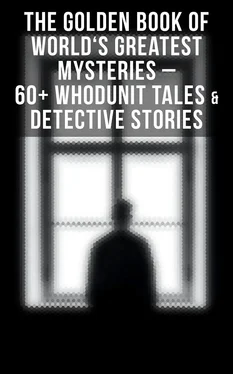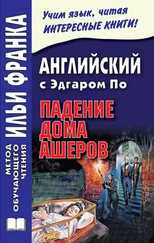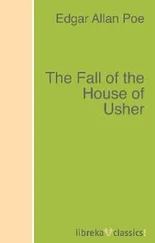We left the house in the sole possession of two police agents—every one of the inmates being removed to prison on the spot. The Sub-prefect, after taking down my "procès verbal" in his office, returned with me to my hotel to get my passport. "Do you think," I asked, as I gave it to him, "that any men have really been smothered in that bed, as they tried to smother me ?"
"I have seen dozens of drowned men laid out at the Morgue," answered the Sub-prefect, "in whose pocketbooks were found letters stating that they had committed suicide in the Seine, because they had lost everything at the gaming-table. Do I know how many of those men entered the same gambling-house that you entered? won as you won? took that bed as you took it? slept in it? were smothered in it? and were privately thrown into the river, with a letter of explanation written by the murderers and placed in their pocketbooks? No man can say how many or how few have suffered the fate from which you have escaped. The people of the gambling house kept their bedstead machinery a secret from us—even from the police! The dead kept the rest of the secret for them. Good-night, or rather good-morning, Monsieur Faulkner! Be at my office again at nine o'clock—in the meantime, au revoir!"
The rest of my story is soon told. I was examined and reexamined; the gambling-house was strictly searched all through from top to bottom; the prisoners were separately interrogated; and two of the less guilty among them made a confession. I discovered that the Old Soldier was the master of the gambling-house— justice discovered that he had been drummed out of the army as a vagabond years ago; that he had been guilty of all sorts of villainies since; that he was in possession of stolen property, which the owners identified; and that he, the croupier, another accomplice, and the woman who had made my cup of coffee, were all in the secret of the bedstead. There appeared some reason to doubt whether the inferior persons attached to the house knew anything of the suffocating machinery; and they received the benefit of that doubt, by being treated simply as thieves and vagabonds. As for the Old Soldier and his two head myrmidons, they went to the galleys; the woman who had drugged my coffee was imprisoned for I forget how many years; the regular attendants at the gambling-house were considered "suspicious," and placed under "surveillance"; and I became, for one whole week (which is a long time), the head "lion" in Parisian society. My adventure was dramatized by three illustrious play-makers, but never saw theatrical daylight; for the censorship forbade the introduction on the stage of a correct copy of the gambling-house bedstead.
One good result was produced by my adventure, which any censorship must have approved: it cured me of ever again trying "Rouge et Noir" as an amusement. The sight of a green cloth, with packs of cards and heaps of money on it, will henceforth be forever associated in my mind with the sight of a bed canopy descending to suffocate me in the silence and darkness of the night.
The Torture by Hope (Villiers de l'Isle Adam)
Table of Content
Many years ago, as evening was closing in, the venerable Pedro Arbuez d'Espila, sixth prior of the Dominicans of Segovia, and third Grand Inquisitor of Spain, followed by a fra redemptor , and preceded by two familiars of the Holy Office, the latter carrying lanterns, made their way to a subterranean dungeon. The bolt of a massive door creaked, and they entered a mephitic in-pace , where the dim light revealed between rings fastened to the wall a blood-stained rack, a brazier, and a jug. On a pile of straw, loaded with fetters and his neck encircled by an iron carcan, sat a haggard man, of uncertain age, clothed in rags.
This prisoner was no other than Rabbi Aser Abarbanel, a Jew of Arragon, who—accused of usury and pitiless scorn for the poor—had been daily subjected to torture for more than a year. Yet "his blindness was as dense as his hide," and he had refused to abjure his faith.
Proud of a filiation dating back thousands of years, proud of his ancestors—for all Jews worthy of the name are vain of their blood—he descended Talmudically from Othoniel and consequently from Ipsiboa, the wife of the last judge of Israel, a circumstance which had sustained his courage amid incessant torture. With tears in his eyes at the thought of this resolute soul rejecting salvation, the venerable Pedro Arbuez d'Espila, approaching the shuddering rabbi, addressed him as follows:
"My son, rejoice: your trials here below are about to end. If in the presence of such obstinacy I was forced to permit, with deep regret, the use of great severity, my task of fraternal correction has its limits. You are the fig tree which, having failed so many times to bear fruit, at last withered, but God alone can judge your soul. Perhaps Infinite Mercy will shine upon you at the last moment! We must hope so. There are examples. So sleep in peace to-night. To-morrow you will be included in the auto da fé : that is, you will be exposed to the quéma-dero , the symbolical flames of the Everlasting Fire: It burns, as you know, only at a distance, my son; and Death is at least two hours (often three) in coming, on account of the wet, iced bandages, with which we protect the heads and hearts of the condemned. There will be forty-three of you. Placed in the last row, you will have time to invoke God and offer to Him this baptism of fire, which is of the Holy Spirit. Hope in the Light, and rest."
With these words, having signed to his companions to unchain the prisoner, the prior tenderly embraced him. Then came the turn of the fra redemptor , who, in a low tone, entreated the Jew's forgiveness for what he had made him suffer for the purpose of redeeming him; then the two familiars silently kissed him. This ceremony over, the captive was left, solitary and bewildered, in the darkness.
Rabbi Aser Abarbanel, with parched lips and visage worn by suffering, at first gazed at the closed door with vacant eyes. Closed? The word unconsciously roused a vague fancy in his mind, the fancy that he had seen for an instant the light of the lanterns through a chink between the door and the wall. A morbid idea of hope, due to the weakness of his brain, stirred his whole being. He dragged himself toward the strange appearance . Then, very gently and cautiously, slipping one finger into the crevice, he drew the door toward him. Marvellous! By an extraordinary accident the familiar who closed it had turned the huge key an instant before it struck the stone casing, so that the rusty bolt not having entered the hole, the door again rolled on its hinges.
The rabbi ventured to glance outside. By the aid of a sort of luminous dusk he distinguished at first a semicircle of walls indented by winding stairs; and opposite to him, at the top of five or six stone steps, a sort of black portal, opening into an immense corridor, whose first arches only were visible from below.
Stretching himself flat he crept to the threshold. Yes, it was really a corridor, but endless in length. A wan light illumined it: lamps suspended from the vaulted ceiling lightened at intervals the dull hue of the atmosphere—the distance was veiled in shadow. Not a single door appeared in the whole extent! Only on one side, the left, heavily grated loopholes sunk in the walls, admitted a light which must be that of evening, for crimson bars at intervals rested on the flags of the pavement. What a terrible silence! Yet, yonder, at the far end of that passage there might be a doorway of escape! The Jew's vacillating hope was tenacious, for it was the last .
Without hesitating, he ventured on the flags, keeping close under the loopholes, trying to make himself part of the blackness of the long walls. He advanced slowly, dragging himself along on his breast, forcing back the cry of pain when some raw wound sent a keen pang through his whole body.
Читать дальше












